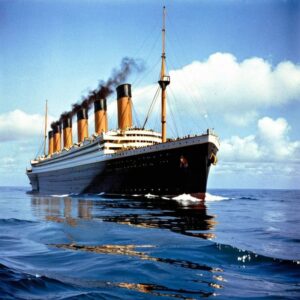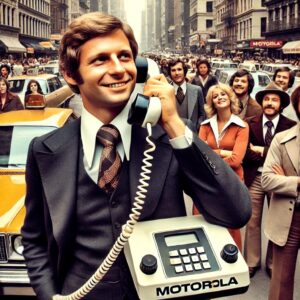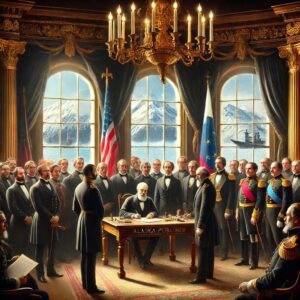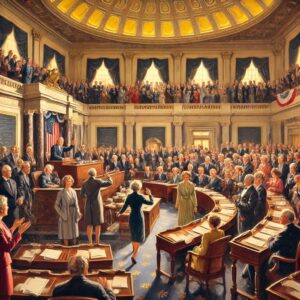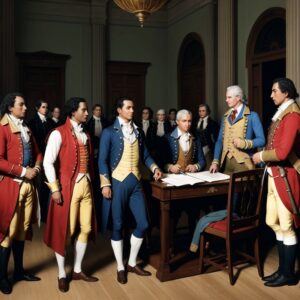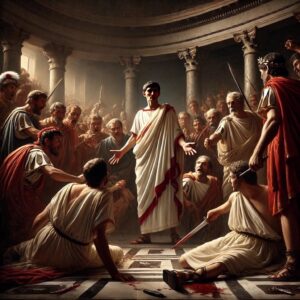On April 13, 1742, the city of Dublin witnessed a musical event that would echo through the ages. George Frideric Handel’s Messiah was performed for the first time, and little did anyone know that this masterpiece would become one of the most beloved choral works in history. The oratorio, featuring the now-iconic “Hallelujah” chorus, was …
Category: Events
Apollo 13: The Successful Failure That Inspired the World
On April 11, 1970, Apollo 13 launched from Kennedy Space Center, carrying three astronauts on what was supposed to be NASA’s third moon landing. Commander Jim Lovell, Command Module Pilot Jack Swigert, and Lunar Module Pilot Fred Haise were ready to make history. However, just two days into the mission, an oxygen tank exploded, crippling …
The Unsinkable Sets Sail: Titanic’s Fateful Journey
On April 10, 1912, the RMS Titanic, the largest and most luxurious ship of its time, set sail from Southampton, England, on its maiden voyage to New York City. Designed to be the pinnacle of modern engineering, Titanic was hailed as “unsinkable,” a triumph of human innovation and ambition. However, just days into its journey, …
The Day the War Ended: Lee Surrenders at Appomattox
On April 9, 1865, the bloody and divisive American Civil War finally came to an end when Confederate General Robert E. Lee surrendered to Union General Ulysses S. Grant at Appomattox Court House in Virginia. After four years of brutal conflict that claimed over 600,000 lives, the nation stood at a turning point. The surrender …
A Hundred Days of Horror: The Rwandan Genocide
On April 7, 1994, one of the darkest chapters in human history began—the Rwandan Genocide. Over the course of just 100 days, nearly one million people, mostly Tutsis, were brutally murdered by extremist Hutu militias. Fueled by deep-rooted ethnic tensions, propaganda, and decades of colonial influence that exacerbated divisions, the genocide unfolded with shocking speed …
America Joins the Fight: The U.S. Enters World War I
On April 6, 1917, the United States officially declared war on Germany, marking a turning point in World War I and in global history. For years, the U.S. had remained neutral, watching from afar as Europe was engulfed in one of the deadliest conflicts the world had ever seen. However, mounting tensions, unrestricted submarine warfare, …
Kurt Cobain: The Tragic End of a Rock Icon
Kurt Cobain, the enigmatic frontman of Nirvana, was more than just a musician—he was the voice of a generation. His raw lyrics, haunting melodies, and rebellious spirit captured the angst and disillusionment of the early ’90s. However, behind the fame and acclaim, Cobain battled inner demons that ultimately led to his untimely death. On April …
A Dream Silenced: The Assassination of Dr. Martin Luther King Jr.
On April 4, 1968, the world lost one of its greatest voices for justice and equality. Dr. Martin Luther King Jr., a leader of the American civil rights movement, was assassinated in Memphis, Tennessee, as he stood on the balcony of the Lorraine Motel. His death sent shockwaves across the nation, sparking grief, outrage, and …
Hello, World! The First-Ever Mobile Phone Call
On April 3, 1973, Martin Cooper, an engineer at Motorola, made history by placing the first-ever mobile phone call. Standing on a bustling street in New York City, he dialed the number on a bulky, brick-sized device and called his rival, Joel Engel of Bell Labs. With that single call, the world took its first …
The End of an Era: Pope John Paul II’s Lasting Legacy
Pope John Paul II passed away on April 2, 2005, marking the end of one of the most influential papacies in history. His time as the leader of the Catholic Church spanned over 26 years, during which he shaped global politics, inspired millions, and redefined the role of the papacy in the modern world. Born …
From Garage to Global Giant: The Birth of Apple Inc.
On April 1, 1976, three visionaries—Steve Jobs, Steve Wozniak, and Ronald Wayne—came together to change the world of technology forever. In a small garage in Cupertino, California, they founded Apple Inc., a company that would go on to revolutionize personal computing, mobile technology, and digital innovation. At the time, computers were massive, expensive machines used …
The Eiffel Tower: From Controversy to Icon
On March 31, 1889, the Eiffel Tower was officially completed and unveiled to the world as the centerpiece of the Exposition Universelle, a world’s fair celebrating the 100th anniversary of the French Revolution. Designed by engineer Gustave Eiffel, the 1,083-foot iron tower was a marvel of modern engineering. However, not everyone was thrilled about its …
The Alaska Deal: America’s Best Bargain
On March 30, 1867, the United States made one of the most surprising and strategic purchases in history—Alaska. The agreement, negotiated by Secretary of State William H. Seward and approved by the U.S. Senate, secured the massive northern territory from Russia for just $7.2 million. At the time, many Americans ridiculed the deal, calling it …
Brexit Begins: The Day the U.K. Chose a New Path
On March 29, 2017, the United Kingdom made history by formally triggering Article 50 of the Treaty on European Union, setting the stage for its departure from the EU. This moment marked the beginning of a long and complex process known as Brexit, a decision that divided the nation and sent shockwaves across Europe. With …
Meltdown at Three Mile Island: America’s Nuclear Wake-Up Call
On March 28, 1979, the United States faced its most serious nuclear accident when a partial meltdown occurred at Three Mile Island Nuclear Generating Station in Pennsylvania. What started as a minor mechanical failure quickly spiraled into a crisis that shook the nation’s confidence in nuclear energy. A cooling system malfunction in Reactor 2 led …
Shaken to the Core: The 1964 Alaska Earthquake
On March 27, 1964, Alaska was rocked by the most powerful earthquake ever recorded in the United States—a staggering 9.2-magnitude tremor that sent shockwaves across the region. Known as the Great Alaska Earthquake, this massive quake lasted an astonishing four and a half minutes, causing widespread destruction and triggering deadly tsunamis. Entire towns were swallowed …
The Shot That Changed the World: Jonas Salk and the Polio Vaccine
In 1953, the world took a monumental step toward eradicating one of the most feared diseases of the 20th century—polio. Dr. Jonas Salk, a virologist and medical researcher, announced that his team had successfully tested a vaccine against poliomyelitis, a devastating disease that primarily affected children, leaving many paralyzed or reliant on iron lungs to …
Inferno in the Factory: The Fire That Changed Labor Laws
On March 25, 1911, tragedy struck in the heart of New York City when the Triangle Shirtwaist Factory fire claimed the lives of 146 workers, most of them young immigrant women. The factory, located on the eighth, ninth, and tenth floors of the Asch Building, was a bustling garment shop where workers endured long hours …
Elvis in Uniform: The King’s Duty to Country
On March 24, 1958, the world watched as Elvis Presley, the undisputed King of Rock and Roll, traded in his blue suede shoes for army boots. At the peak of his career, Presley answered the call of duty and enlisted in the United States Army, a move that stunned fans and reshaped his legacy. With …
Black Tide: The Exxon Valdez Disaster and Its Lasting Impact
On March 24, 1989, the world witnessed one of the most devastating environmental disasters in history—the Exxon Valdez oil spill. In the early morning hours, the Exxon Valdez, an oil tanker carrying over 53 million gallons of crude oil, struck Bligh Reef in Prince William Sound, Alaska. Within hours, approximately 11 million gallons of thick, …
A Step Toward Equality: The Senate’s Historic Passage of the Equal Rights Amendment
On March 22, 1972, the United States Senate made history by passing the Equal Rights Amendment (ERA), a bold step toward ensuring gender equality under the law. The amendment, which stated that “equality of rights under the law shall not be denied or abridged by the United States or by any State on account of …
From 140 Characters to a Global Phenomenon: The Birth of Twitter
In 2006, a small team of innovators led by Jack Dorsey launched a simple idea that would forever change the way people communicate. Their creation, Twitter, was initially meant to be a short-form messaging platform where users could share quick updates with friends. Little did they know, they were laying the foundation for one of …
The 2003 Invasion of Iraq: A War That Shaped the 21st Century
On March 20, 2003, the United States, along with a coalition of allies, launched a military invasion of Iraq. Dubbed “Operation Iraqi Freedom,” the war aimed to overthrow Iraqi leader Saddam Hussein, who was accused of possessing weapons of mass destruction (WMDs) and supporting terrorism. What began as a swift military campaign soon unraveled into …
Rekindling the Olympic Flame: Pierre de Coubertin’s Vision for Global Unity
In 1894, a French educator named Pierre de Coubertin had a dream—one that would transcend borders, cultures, and politics. He envisioned a revival of the ancient Olympic Games, an event that had once united the city-states of Greece in peaceful competition. But instead of limiting it to one country or a single region, he sought …
The 1790 Naturalization Act: The Birth of American Citizenship—But Not for All
In 1790, just a few years after the birth of the United States, Congress passed the first law defining who could become an American citizen. The Naturalization Act of 1790 established a process for granting citizenship to immigrants, but with a stark limitation—it was restricted to “free white persons” of good moral character who had …
St. Patrick’s Day: A Global Celebration of Irish Spirit
Every year on March 17, people around the world don green attire, raise a glass, and take to the streets to celebrate St. Patrick’s Day. What began as a religious feast day honoring Ireland’s patron saint has evolved into a global festival of Irish culture, heritage, and unity. From the bustling parades of New York …
The My Lai Massacre: A Dark Day in American History
War often reveals both the best and worst of humanity, but few events in modern military history compare to the horror of the My Lai Massacre. On March 16, 1968, during the Vietnam War, a company of U.S. soldiers from Charlie Company, 1st Battalion, 20th Infantry Regiment, committed one of the most infamous war crimes …
The Ides of March: The Fall of Julius Caesar
On March 15, 44 BC, a date forever marked in history as the Ides of March, the mighty Julius Caesar met his tragic end at the hands of those he once trusted. The Roman leader, who had risen from a skilled general to the most powerful man in Rome, was assassinated by a group of …
The Birth of Genius: Albert Einstein’s Arrival
On March 14, 1879, in the quiet town of Ulm, Germany, a child was born who would one day revolutionize our understanding of the universe. Albert Einstein entered the world as an unassuming infant, but his mind would later unlock mysteries of time, space, and energy in ways no one had ever imagined. His journey …




